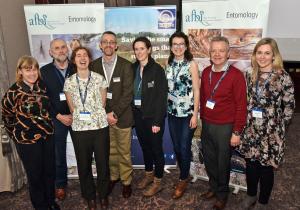Helping the bees and butterflies to avoid 'Insectageddon'
Date published:
Recent headlines have suggested an ‘insectageddon’, where several scientific studies have shown a substantial and worrying decline in insect abundance and hence a decline in biodiversity which support many ecosystems in Northern Ireland's natural capita.

To look at some of these issues from a local context, AFBI staff convened a one-day meeting on “Invertebrate Conservation and Landscape Management in Ireland - Restoring Biodiversity in the Irish Landscape” in conjunction with the Royal Entomological Society and Buglife. The meeting was held in the Canal Court Hotel Newry on Thursday 28th February 2019 and attracted 60 delegates from across Ireland.
Ten speakers gave practical advice on the pros and cons of conserving invertebrate species and their habitats in Ireland. There were talks on bees, butterflies and moths, ants, snails, freshwater pearl mussel, white clawed crayfish and ladybirds.
The speakers spoke of Ireland's broad diversity of invertebrates, for example Ireland has 99 species of bee (1 honeybee, 21 bumblebees and 77 solitary bees), but also flagged the risks posed by intensification of agriculture, habitat loss, pollution and invasive species on Ireland's highly valued natural capita. A general theme was that of engaging with land-managers and policy-makers to provide clear, evidence-based advice to address the loss of diversity which supports the health of many ecosystems services. It was also clear from many of the speakers that abandonment of the land can be as much of a problem as intensification, and that many species relied on specific levels of grazing and other extensive agricultural practices.